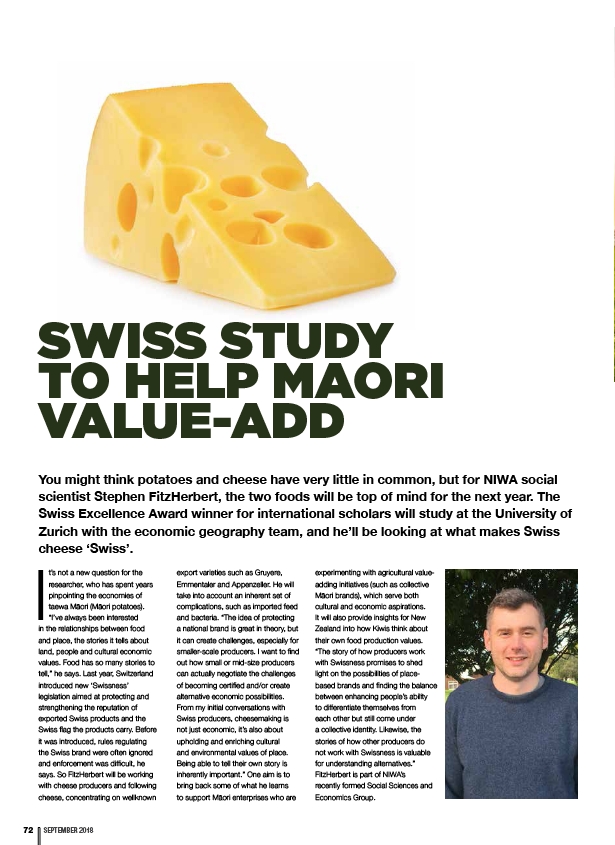
SWISS STUDY
TO HELP MAORI
VALUE-ADD
You might think potatoes and cheese have very little in common, but for NIWA social
scientist Stephen FitzHerbert, the two foods will be top of mind for the next year. The
Swiss Excellence Award winner for international scholars will study at the University of
Zurich with the economic geography team, and he’ll be looking at what makes Swiss
cheese ‘Swiss’.
It’s not a new question for the
researcher, who has spent years
pinpointing the economies of
taewa Māori (Māori potatoes).
“I’ve always been interested
in the relationships between food
and place, the stories it tells about
land, people and cultural economic
values. Food has so many stories to
tell,” he says. Last year, Switzerland
introduced new ‘Swissness’
legislation aimed at protecting and
strengthening the reputation of
exported Swiss products and the
Swiss flag the products carry. Before
it was introduced, rules regulating
the Swiss brand were often ignored
and enforcement was difficult, he
says. So FitzHerbert will be working
with cheese producers and following
cheese, concentrating on wellknown
72 SEPTEMBER 2018
export varieties such as Gruyere,
Emmentaler and Appenzeller. He will
take into account an inherent set of
complications, such as imported feed
and bacteria. “The idea of protecting
a national brand is great in theory, but
it can create challenges, especially for
smaller-scale producers. I want to find
out how small or mid-size producers
can actually negotiate the challenges
of becoming certified and/or create
alternative economic possibilities.
From my initial conversations with
Swiss producers, cheesemaking is
not just economic, it’s also about
upholding and enriching cultural
and environmental values of place.
Being able to tell their own story is
inherently important.” One aim is to
bring back some of what he learns
to support Māori enterprises who are
experimenting with agricultural valueadding
initiatives (such as collective
Māori brands), which serve both
cultural and economic aspirations.
It will also provide insights for New
Zealand into how Kiwis think about
their own food production values.
“The story of how producers work
with Swissness promises to shed
light on the possibilities of placebased
brands and finding the balance
between enhancing people’s ability
to differentiate themselves from
each other but still come under
a collective identity. Likewise, the
stories of how other producers do
not work with Swissness is valuable
for understanding alternatives.”
FitzHerbert is part of NIWA’s
recently formed Social Sciences and
Economics Group.